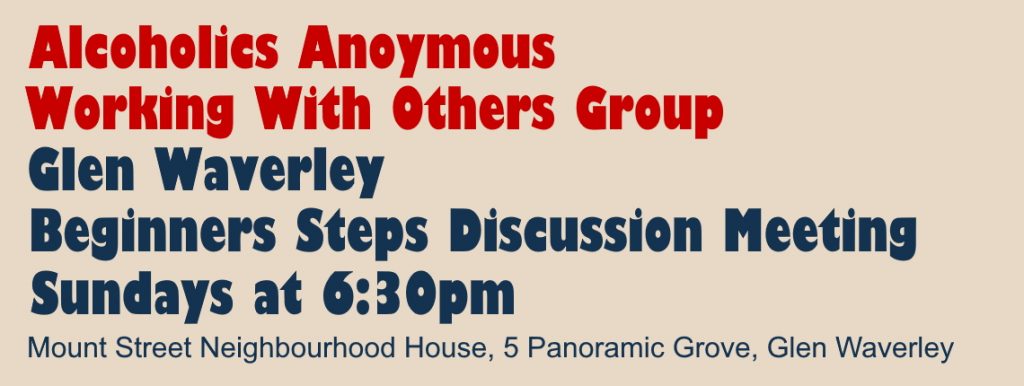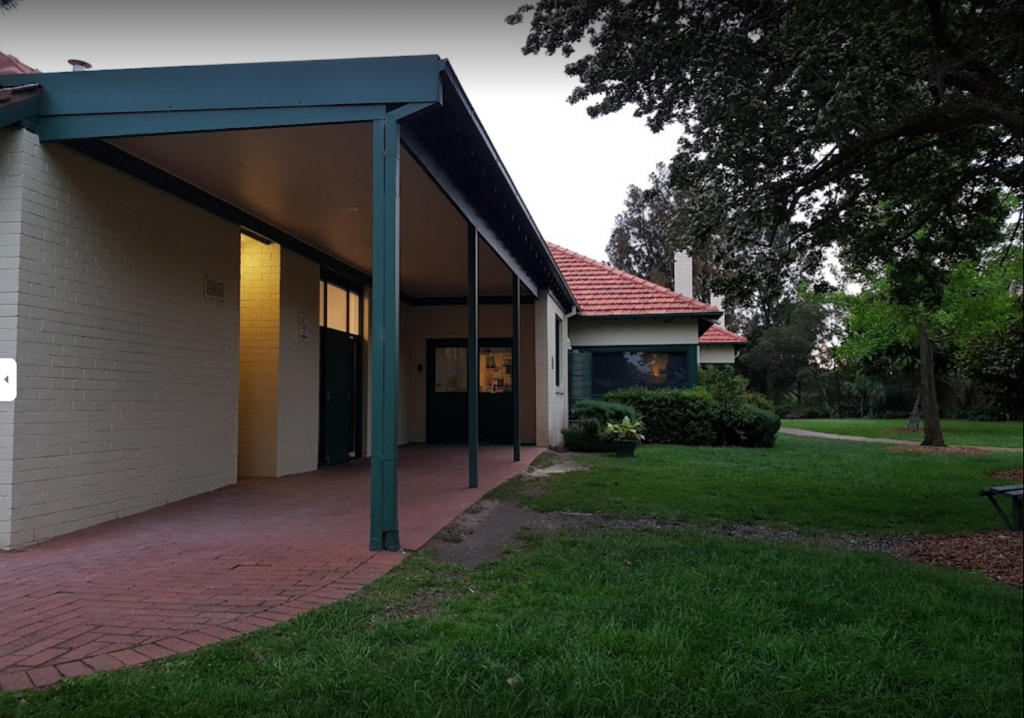Beginners Steps Discussion Meeting – Glen Waverley


In-Person at Glen Waverley
Beginners Steps Discussion Meeting
Sunday 6:30pm
Mount Street Neighbourhood House
5 Panoramic Grove, Glen Waverley
(Alternative entrance 6 Mount Street)
Our group has a meeting in Glen Waverley on Sunday evenings at 6:30pm. It’s also Beginners Steps Discussion Meeting. Everyone welcome.
If you think you have a problem with alcohol, you are welcome to attend the meeting.
At our meeting, we focus on AA’s 12 step program of recovery. The meeting is in the format of a ‘discussion’ with topics suggested by members. New members are encouraged to share and to suggest topics.
Here’s the full list of suggested topics we use:
Step One
- How do I know I am an alcoholic?
- How is our drinking different from the average drinker?
- What happened when we tried to control our drinking?
- How did our drinking affect other people?
- How did we try to hide our drinking?
- When did we start to realise we drink differently to others?
- How has our drinking made our lives unmanageable?
- Why do we need complete abstinence from alcohol?
- When did we decide to stop drinking?
- What excuses have we used to start drinking again?
- What is our experience of returning to AA after a relapse?
- What are some personal examples of having no defence against the first drink?
- What is our experience of the alcoholic cycle?
- What convinced us we were powerless over alcohol?
Step Two
- What does the AA program promise?
- When did we realise that the drinking problem could be solved?
- Has fear been able to keep us sober?
- When did we find hope?
- Why do we need a Higher Power?
- What was our reaction to the proposals in the steps?
- What convinced us that the AA program could work for us?
- How do we keep an open mind on spiritual ideas?
- How did we come to believe?
- How did we choose our own conception of God?
- Why are we seeking a spiritual experience?
- What convinced us to try the steps?
- What was our experience with AA if we didn’t believe in God?
Step Three
- What are we deciding to do when we take step three?
- How did we become willing to take step three?
- Why do I need a ‘new manager’?
- What was our experience of taking step three?
- What do we do to start living on a spiritual basis?
- What did we do after taking step three?
- When were we ready to start the housecleaning steps?
Step Four
- Why is inventory necessary?
- What made us balk at Step Four?
- What prompted us to proceed with Step Four?
- How did we take inventory?
- How are resentments dangerous to us?
- What did we learn about ourselves from step four?
- What fears did we discover while taking step four?
- How did we shape a sane and sound ideal for our future sex/relationship conduct?
- What did we learn from analysing our resentments?
- How do we ensure our fourth step is fearless and thorough?
- How did we feel about ourselves after completing step four?
- How difficult was Step Four?
Step Five
- Why do we need to share our inventory with another person?
- How did we choose the person or people to hear our inventory?
- How did we overcome our reluctance to share our inventory with another person?
- What did we discover about ourselves while sharing our inventory?
- What was our experience sharing our secrets with someone?
- How do we carefully review what we have done so far?
- What do we do if we discover we have omitted something from our inventory?
- What was the effect felt in the days after taking step five?
Step Six
- Why is step six important in the AA program?
- What defects of character have we identified?
- What does it mean to be ‘entirely ready’ in step six?
- What defects of character did we hesitate to give up?
- How did we become willing to change?
- Are we entirely ready to have selfishness removed?
- Are we entirely ready to have dishonesty removed?
- Are we willing to be free from anger?
- Are we willing to be courageous?
Step Seven
- How did we find the humility to take step seven?
- What spiritual qualities do we aspire to?
- Which of our shortcomings have we seen removed?
- What do we pray for in step seven?
- What spiritual progress have we made?
- What’s so great about humility?
- How do we live up to our spiritual principles?
Step Eight
- How did we become willing to make amends?
- What does it mean to ‘go to any lengths’?
- What amends did we balk at doing?
- What selfish and inconsiderate habits did we have?
- How did we overcome reluctance to make amends?
- What are some examples of amends we can’t or shouldn’t make?
- What do we do about wrongs we can never right?
Step Nine
- How do we make amends to our loved ones?
- What amends are the hardest?
- How did we approach making amends to our creditors?
- How did we make amends for crime?
- What reaction surprised us when making amends?
- How have we made amends to family?
- How have we made amends to former or current spouses?
- How do we make amends to people who don’t like us?
- How do we ensure our amends are sensible, tactful, considerate and humble?
- How does our experience benefit others?
- How do we know when we are in ‘fit spiritual condition’?
Step Ten
- What does it mean to be ‘rigorously honest’?
- What is our daily routine for inventory?
- How do we watch for selfishness, dishonesty, resentment and fear?
- How do we deal with new resentments when they crop up?
- How do we turn our thoughts to someone we can help?
- Was sanity restored by the time we got to step ten?
- If we are in fit spiritual condition, what happens if we are tempted to drink?
- How do we constructively review our day?
- When taking inventory, how do we avoid drifting into worry and remorse?
- Once the housecleaning steps are done, what is the greatest danger to our sobriety?
- How is the program a ‘design for living’?
- When did we feel that the drink problem had been overcome?
- What’s it like to be ‘restored to sanity’?
- How do we grow in understanding and effectiveness?
Step Eleven
- When did we start to try meditation and prayer?
- How has our practice of prayer and meditation changed over time?
- What do we ask for in prayer?
- How do we enlarge on our spiritual life?
- What is our morning spiritual routine?
- In what way is our thinking on a higher plane?
- Where have we seen that religious people are right?
- Has there been a revolutionary change in our way of living and thinking?
- How do we maintain our own discipline?
Step Twelve
- Why do we do twelfth step work?
- Where do we find twelfth step opportunities?
- What do we get from being on a twelfth step roster?
- How do we prepare for a twelfth step visit?
- What has been our experience sharing at detoxes, rehabs and prisons?
- How do we carry the message in Speaker/ID meetings?
- How do we attract sponsees?
- What are the joys of working with others?
- What message do we pass on to newcomers in AA?
- What are the components of ‘intensive work with other alcoholics’?
- What prejudices have we encountered when trying to carry the message?
- How have we dealt with someone who is looking for help but is drunk?
- What parts of our stories do we need to tell to carry the message?
- How do we describe alcoholism to newcomers and non-alcoholics?
- How do we illustrate the mental twist that leads to a drink?
- What do we tell newcomers about our struggles to stop?
- How do we emphasise the hopeless nature of alcoholism to newcomers?
- What solution are we offering to newcomers?
- When should we stress the spiritual feature of the program to newcomers?
- How do we use everyday language to describe spiritual principles to newcomers?
- How do we outline the program of action to someone new?
- What part does the twelfth step play in our sobriety?
- How do we deal with sponsees who rebel against the program?
- How do we describe the fellowship to someone who has never been to a meeting?
- What practical advice do we offer to a newcomer?
- What practical advice do we offer to families of a problem drinker?
- How do we introduce our sponsees to twelfth step work?
- How do we explain our alcoholic condition to friends and family?
- How do we put ourselves where we can be of maximum help to others?
- What is our motive for helping others?
- Which of the steps were the most life changing?
- How do we know we have had a ‘spiritual awakening’?
- What are the principles we practice?
- What can we do each day for the alcoholic who is still suffering?